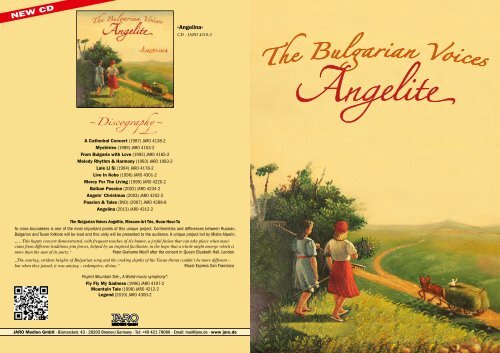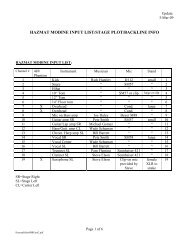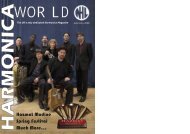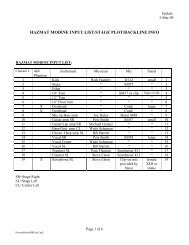The Bularian Voices - JARO Medien
The Bularian Voices - JARO Medien
The Bularian Voices - JARO Medien
Sie wollen auch ein ePaper? Erhöhen Sie die Reichweite Ihrer Titel.
YUMPU macht aus Druck-PDFs automatisch weboptimierte ePaper, die Google liebt.
NEW CD<br />
~ Discoraph ~<br />
A Cathedral Concert (1987) <strong>JARO</strong> 4138-2<br />
Mystèries (1989) <strong>JARO</strong> 4153-2<br />
From Bulgaria with Love (1992) <strong>JARO</strong> 4165-2<br />
Melody Rhythm & Harmony (1993) <strong>JARO</strong> 1993-2<br />
Lale Li Si (1994) <strong>JARO</strong> 4178-2<br />
Live In Kobe (1996) <strong>JARO</strong> 4301-2<br />
Mercy For <strong>The</strong> Living (1999) <strong>JARO</strong> 4220-2<br />
Balkan Passion (2002) <strong>JARO</strong> 4234-2<br />
Angels‘ Christmas (2003) <strong>JARO</strong> 4252-2<br />
Passion & Tales (DVD) (2007) <strong>JARO</strong> 4288-8<br />
Angelina (2013) <strong>JARO</strong> 4312-2<br />
<strong>The</strong> Bulgarian <strong>Voices</strong> Angelite, Moscow Art Trio, Huun-Huur-Tu<br />
To cross boundaries is one of the most important points of this unique project. Conformities and differences between Russian,<br />
Bulgarian and Tuvan folklore will be lead and this unity will be presented to the audience. A unique project led by Misha Alperin.<br />
„… This happy concert demonstrated, with frequent touches of sly humor, a joyful fusion that can take place when musicians<br />
from different traditions join forces, helped by an inspired facilitator, in the hope that a whole might emerge which is<br />
more than the sum of its parts.“ Peter Grahame Woolf after the concert in Queen Elizabeth Hall, London<br />
„<strong>The</strong> soaring, strident heights of Bulgarian song and the craking depths of the Tuvan throat couldn´t be more different –<br />
but when they joined, it was amzing – redemptive, divine.“ Music Express San Francisco<br />
Project Mountain Tale „ A World-music symphony“:<br />
Fly Fly My Sadness (1996) <strong>JARO</strong> 4197-2<br />
Mountain Tale (1998) <strong>JARO</strong> 4212-2<br />
Legend (2010) <strong>JARO</strong> 4300-2<br />
»Angelina«<br />
CD - <strong>JARO</strong> 4310-2<br />
<strong>JARO</strong> <strong>Medien</strong> GmbH ∙ Bismarckstr. 43 ∙ 28203 Bremen/Germany ∙ Tel: +49 421 78080 ∙ Email: mail@jaro.de · www jaro.de<br />
<strong>The</strong> <strong>Bularian</strong> <strong>Voices</strong>
<strong>The</strong> Bulgarian choir waves its magic. <strong>The</strong>y produce sounds of the most peculiar vocal timbre, almost as if it was not produced by the<br />
human vocal apparatus at all but by an instrument from some foreign corner of the world. <strong>The</strong>y glissando, shout and embellish,<br />
combine crazy rhythms, stack their voices to form audacious chords. And suddenly the folklore clich... cracks. Archaic sound-worlds<br />
from far-distant times are what one listener thinks he has heard, another a - marriage of avant-garde and the medieval. Both are talking<br />
about the same unique choir of twenty women: <strong>The</strong> Bulgarian <strong>Voices</strong> - Angelite.<br />
No-one who has experienced one of the many concerts performed by this incomparable, legend-in-its-own-time choir has been able<br />
to escape the charm and fascination of its voices. Before the fall of the iron curtain, it was known only to insiders in the West, but since<br />
the end of the 1980s the Bulgarian <strong>Voices</strong> have attained unparalleled success - the reward: In 1993 the choir was nominated for two<br />
Grammies in the U.S.<br />
<strong>The</strong> long expected new CD of the choir from Sofia will be presented in 2013/14 in Europe.<br />
<strong>The</strong> Bulgarian <strong>Voices</strong> - Angelite is the ensemble name since 1995. <strong>The</strong>y started to work with <strong>JARO</strong> in 1987 under a french name<br />
and were successful around the world since that<br />
time. <strong>The</strong> outstanding women’s choir – Angelite offers<br />
a remarkable music program, in which the folklore<br />
of the ancient times enriches and renders its<br />
emotional energy to the music of today. On concert<br />
tours the world over, the singers have roused the<br />
enthusiasm of countless listeners with their surprising,<br />
enchanting and incredibly precise song - song<br />
which touches the soul. <strong>The</strong>y showed in collaborations<br />
with musicians from all cultures that their musical<br />
approach led them to a mysterious marvel.<br />
Performances at the Nobel Peace Prize in Oslo or<br />
on the Red Square of Moscow on the occasion of<br />
the 850. anniversary of the City of Moscow were<br />
requested.<br />
NEW CD: »ANGELINA« <strong>JARO</strong> 4310-2<br />
<strong>The</strong> album presents an opportunity for professional<br />
ethno-music speculations and analysis but the<br />
main idea is to share with the listeners the pleasure<br />
of the music. Each song brings its own touch or<br />
colour to the kaleidoscopic picture, which reveals<br />
the musical atmosphere and temperament of the<br />
Bulgarian folklore. <strong>The</strong> variety of performances<br />
highlights the remarkable singing qualities of the 20 singers – a polyphonic instrument in the hands of their conductor and soloists – successors<br />
of ancient art of singing. One of the unifying musical elements in this project is the rhythm. <strong>The</strong> Bulgarian folkmusic is famous for<br />
the abundance of irregular, asymmetric measures – dubbed by<br />
Bela Bartok the “Bulgarian rhythm”. Many of the songs on the album are built on such a meter and rhythm base. <strong>The</strong> sound of the<br />
drum in Bulgaria is a symbol of the feast and of dancing horo (round chain dance). We can hear it in some of the authors’ arrangements,<br />
performed by one of the best Bulgarian percussionists – Stoyan Yankulov.<br />
In the mosaic structure of the program cohabit contrasting in their characteristics – solo, choral and in some of them instrumental<br />
accompaniment. <strong>The</strong> folklore, ancient and modern, is present with elegant balance between tradition and modern approach. Choir and<br />
soloists pursue strictly the respective region, local style and musical dialects. <strong>The</strong>y recreate the patterns of the old musical folklore in a<br />
mode close to the old traditions from the different regions.<br />
A musical surprise in this album is a song taken from the folklore of an ethnic group Karakachani (nomad mountain shepherds) who<br />
live for ages in Bulgaria. <strong>The</strong> singer, performing the song is one of them by birth.<strong>The</strong> traditional melody is harmonized by instrumental<br />
accompaniment. <strong>The</strong> compositions of Zdravko Manolov “Tapan bie” and Georgi Petkov “Ochi, ochi”, “Gaidine sviriat”, show the individual<br />
approach of the authors of closeness or remoteness to the original traditional song. ”Erke, mori, Erke” - a traditional song from the Shope<br />
region is arranged by Georgy Petkov into multi-voice choral version with perceptible Shope discordance. <strong>The</strong> drums emphasize complex<br />
rhythmic formulas and fragmentation into irregular measure of 12/16.<br />
Within the wealth of colors in the program, two songs stand out for their styles – they are the works of <strong>The</strong>odosii Spassov, recognized as<br />
the best kaval player in the world. His two songs in the program, written specially for this project, reflect his view of the world – concentrated,<br />
playful, noble, heart-felt and natural.<br />
<strong>The</strong> remarkable Bulgarian composer Ivan Spassov uses in his compositions aleatory technique with overlapped polyphonic patterns.<br />
Creatively developed, from the roots of the traditional song “Leilinko, kuzum pilianze” springs a creatively developed musical work with free,<br />
irregular harmony and soft sonority. This is one of the last songs of Ivan Spassov, written at the end of his path of life, specifically for <strong>The</strong><br />
Bulgarian <strong>Voices</strong> - Angelite. <strong>The</strong> music reveals the philosophy of the author relating to the universe and eternity.<br />
<strong>The</strong> last song of the album is the end of a journey, which starts in the distant past and ends in our days. A journey in which one can<br />
experience the power of the folk art, feel the bond between generations and learn about the millenary Bulgarian music history.<br />
Es sind faszinierende, glockenhelle Stimmen. Der hypnotische Gesang verzaubert, denn es ist eine ganz ursprüngliche Art zu singen.<br />
Wer einmal ein Konzert des einzigartigen Chores live erlebt hat, also einmal seine Seele von diesem Gesang berühren lies, kann<br />
dem Zauber und der Faszination von <strong>The</strong> Bulgarian <strong>Voices</strong> - Angelite nicht mehr vergessen. Als die Welt erstmals diese besondere<br />
Art zu singen zur Kenntnis nahm, zur Zeit des Eisernen Vorhangs, staunte sie über die bulgarischen Stimmen und war begeistert.<br />
Seit 1987 unternehmen sie Konzertreisen durch die ganze Welt und erhielten u.a. 1993 zwei Grammy-Nominierungen, sie spielten u.a.<br />
bei der Verleihung des Friedensnobelpreises in Oslo oder zur 850 Jahrfeier von Moskau auf dem Roten Platz. Die Trennung zwischen Ost<br />
und West, Jung und Alt, Pop und Klassik wird aufgehoben. Äußerlich wirkt der A-cappella-Chor wie eine grellbunte Volkstanztruppe, doch die<br />
Mischung aus aberwitzigen Rhythmen und verwegenen Akkorden, der schlicht unverblümt direkte Klang fegen jeden Verdacht des Folklore-<br />
Kitschs umgehend aus den Gehörgängen der ZuhörerInnen. Ihe Musik wurde in Hollywood-Filmen verwertet, in internationalen Werbespots<br />
benutzt, von Dj‘s aus aller Welt gesampelt.<br />
Nun sind sie mir ihrem neuen Album »Angelina« zurück, das sie 2013/14 in aller Welt vorstellen werden:<br />
»ANGELINA« <strong>JARO</strong> 4310-2<br />
Der bedeutende Frauenchor <strong>The</strong> Bulgarian <strong>Voices</strong> - Angelite bietet ein<br />
beeindruckendes Musikprogramm, das mit Folkloremusik aus alten Zeiten<br />
bereichert und der Musik von heute neue Impulse verleiht. Das Programm<br />
beleuchtet die zeitgenössische Musik im Bereich der Folklore und zeigt eine<br />
Aufeinanderfolge unterschiedlicher Annäherungen an das traditionelle bulgarische<br />
Erbe. Dargestellt werden hier das parallele Miteinander verschiedener<br />
Musikstile und musikalischer Formen: von archaischen Volksliedern bis<br />
hin zu Autorenkompositionen, die zwar auf der Grundlage der traditionellen<br />
Musik aufbauen, hierfür jedoch zeitgemäße Ausdruckmittel verwenden.<br />
Das Album gibt Gelegenheit zum professionellen Nachsinnen über Ethno-Musik<br />
und zur fachgerechten Analyse. Als Leitgedanke gelte hier jedoch,<br />
zusammen mit den Zuhörern den Genuss der Musik zu teilen. Jedes Musikstück<br />
berührt oder färbt auf seine ganz eigene Weise das Kaleidoskop, das<br />
die Atmosphäre und das Temperament bulgarischer Folklore offenlegt. Die<br />
Vielfalt der Darbietungen stellt die außergewöhnlichen Gesangsqualitäten<br />
der 20 Sängerinnen heraus, ein polyphones Instrument in den Händen der<br />
Dirigentin und der 20 Solistinnen, Nachfahren der altertümlichen Gesangskunst.<br />
Ein einigendes musikalisches Element in diesem Projekt ist der Rhythmus.<br />
Die bulgarische Volksmusik ist berühmt für ihre Vielzahl an unregelmäßigen<br />
Taktarten, die von Bela Bartok als die „bulgarischen Taktarten” bezeichnet<br />
worden sind. Viele Lieder des Albums bauen in Takt und Rhythmus<br />
hierauf auf. In Bulgarien gilt der Sound der Trommel als Symbol für Feste und Horo (Kreistanz). Sie ist in einigen Werken des Komponisten<br />
zu hören, die von einem der besten bulgarischen Perkussionisten, Stoyan Yankulov, klanglich dargestellt wurden. In der Mosaiktextur des<br />
Programms treffen Soli, Chorgesang und instrumentale Begleitung mit ihren so unterschiedlichen Eigenschaften aufeinander. Die Folklore,<br />
aus alter und aus neuer Zeit, schafft den eleganten Spagat zwischen Tradition und moderner Interpretation. Chor und Solistinnen folgen<br />
streng der jeweiligen Region, dem lokalen Stil und den musikalischen Dialekten. Sehr angelehnt an die alten Traditionen aus den verschiedenen<br />
Regionen gelingt ihnen eine Neuerschaffung der alten musikalischen Strukturen innerhalb der Folklore.<br />
Als musikalische Überraschung in diesem Album gilt ein Lied aus der Folklore der ethnischen Gruppe Karakachani (Nomaden und<br />
Hirten aus den Bergen), deren Mitglieder seit langer Zeit in Bulgarien leben. Der Sänger des Liedes selbst hat hier seine Wurzeln. Mit instrumentaler<br />
Begleitung wird die tradierte Melodie harmonisiert. Die Kompositionen von Zdravko Manolov „Tapan bie” und Georgi Petkov<br />
„Ochi, ochi”, „Gaidine sviriat” zeigen, mit welcher Nähe bzw. Entfernung das originale Traditionsstück ganz individuell von den Komponisten<br />
interpretiert wurde. „Erke, mori, Erke” - ein Musikstück in der Tradition der Shope-Region wird von Georgy Petkov in eine mehrstimmig<br />
Chorversion mit wahrnehmbarer Shope-Dissonanz verwandelt. Die Trommeln betonen den komplexen Rhythmus und die Fragmentierung<br />
in unregelmäßige 12/16-Takte.<br />
Aus dem sehr farbenfrohen Programm heben sich zwei Lieder durch ihren Stil besonders hervor: Die Werke von <strong>The</strong>odosii Spassov –<br />
einem herausragenden Musiker, dem sein Ruf als bester Kavalflötenspieler weltweit vorauseilt. Das Programm enthält zwei Musikstücke<br />
von ihm, die er speziell für dieses Projekt geschrieben hat und in denen sich seine Ansicht über die Welt widerspiegelt: intensiv, spielerisch,<br />
edel, herzlich und natürlich.<br />
Der bemerkenswerte bulgarische Komponist Ivan Spassov bedient sich in seinen Kompositionen der Aleatorik mit überlappenden<br />
polyphonen Mustern. Den Wurzeln des traditionellen Lieds „Leilinko, kuzum pilianze” z. B. entspringt ein kreativ entwickeltes musikalisches<br />
Werk mit freier unregelmäßiger Harmonie und leichter Klangfülle. Dieses ist eines der letzten Lieder von Ivan Spassov, geschrieben am Ende<br />
seines Lebens, speziell für den bulgarischen Chor <strong>The</strong> Bulgarian <strong>Voices</strong> - Angelite. Die Musik offenbart die Philosophie des Komponisten<br />
im Hinblick auf das Universum und die Ewigkeit.<br />
Das letzte Lied des Albums ist das Ende einer Reise, die in der Vergangenheit anfing und in unseren Tagen endet. Eine Reise, in der<br />
man die Macht der Volkskunst erleben, die Verbindung zwischen den Generationen spüren und über die jahrtausendealte bulgarische<br />
Geschichte erfahren kann. Natalia Rashkova – Musikwissenschaftlerin








